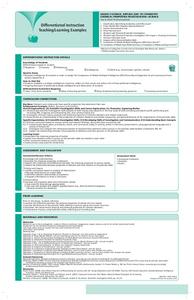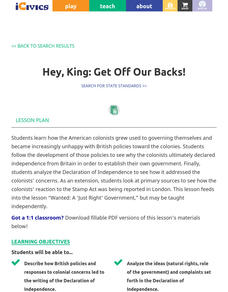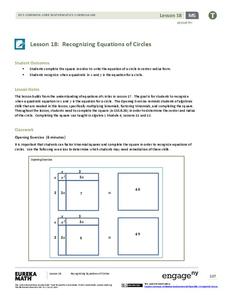Austin Independent School District
Forearm Pass/Setting
Here is a beautifully designed volleyball lesson plan on the forearm pass/bump and overhead pass/set. It includes a detailed multimedia presentation and set of instructional guidelines, skill cues, and lists of strategies for...
EduGAINs
Chemical Properties Investigation
This lesson demonstrates differentiated instruction at its best. Over the course of 2-3 class periods, young chemists have the opportunity to gain a thorough understanding of metals and their chemical properties from a variety of...
ReadWriteThink
Promoting Student Self-Assessment
Keep class members accountable for their own learning with a series of differentiated instruction strategies. From rubrics created by pupils to learning contracts written at the beginning of the year, the resource offers multiple ways...
Curated OER
When Is a Noun a Verb? Examining Double Duty Words
The New York Times' Learning Network provides great lessons! This one uses articles from the paper to help readers understand homonyms like mail (verb and noun). It also includes an exercise in reading informational text. Links to the...
Pace University
Grades 9-12 Earth Science
How has Earth changed over time? Pupils explore the topic in a differentiated instruction unit on the geological time scale. After a pre-assessment to gauge knowledge, class members divide into groups based on their ability levels and...
Pace University
Grades 9-10 Energy Sources
Alternative energy sources are becoming increasingly important. Learners have the opportunity to explore alternative energy sources using a differentiated instruction unit. They group together based on ability levels, assign roles to...
Curriculum Development Institute
Life in the Age of Machines
What was life like during the Industrial Revolution? Using a variety of activities, including writing out the dreams of laborers, industrialists, and urban dwellers, learners consider the positive and negative impacts of the Age of...
National Endowment for the Humanities
The New Order for "Greater East Asia"
Sometimes the New Order becomes synonymous with its implications for European countries, but what about its consequences for East Asia? The final instructional activity in a four-part series teaches scholars about World War II. High...
Curated OER
Adding to the Picture: The 1963 March on Washington
Who do your scholars imagine when they think about the civil rights movement? If only a few faces come to mind, this activity will expand their concepts of the movement's leaders. Learners examine an image of the 1963 March on...
Ontario
Reading Graphic Text
Do learners really need to be taught how to read cartoons, comic books, and comic strips? Yes. Just as they need to learn how to read other forms of graphic text such as diagrams, photos, timetables, maps, charts, and tables. Young...
EduGAINs
Introduction to Solving Linear Systems
Word problems offer class members an opportunity to learn the concept of solving linear systems using graphs. Individuals choose a problem based upon preferences, break into groups to discuss solution methods and whether there is...
Ontario
Critical Literacy—Media Texts
Media texts convey both overt and implied messages. As part of their study of media, class members analyze the language, form, techniques, and aesthetics in a variety of media texts.
EduGAINs
Consumerism, Me and the Natural Environment— Canadian and World Studies
Just as no man is an island, no country is totally independent of other countries. To understand the impact of individual consumer decisions on the global natural environment, class groups consider how the stuff they purchase connects to...
EduGAINs
Coureurs de Bois, First Nation Peoples, and the Fur Trade
The interactions between the Coureurs de bois (runners of the woods) and the First Nation Peoples as they engaged in the fur trade are the focus on this Canadian history exercise. Kids select learning centers based on their learning...
EduGAINs
Governmental Apology for the Aboriginal Experience—Canadian and World Studies
What constitutes an effective apology? After considering a series of scenarios, class members develop criteria for an effective apology and then use these indicators to evaluate Canada's Prime Minister Harper's apology to former...
West Virginia Department of Education
Intelligence of Authentic Character - News Coverage and John Brown's Raid
The resource, a standalone, shows how news coverage of John Brown's Raid began when the event happened and how that reporting shaped perception in West Virginia history. The resource includes interesting anticipatory discussion...
EduGAINs
Ratio and Proportion
Do these items have the same ratio? Through a learning contract, pupils master proportions by practicing proportions via word problems, graphs, and with manipulatives. An exit ticket checks for understanding at the end of the...
EduGAINs
Solving Linear Equations
To find x, you have to get it by itself, correct? Individuals solve a linear word problem and share their solutions with others that solved the problem in a similar fashion. They then complete a self-assessment on how they feel about...
iCivics
Hey, King: Get Off Our Backs!
Young historians explore the reason American colonists were unhappy under British rule. Class members complete hands-on activities and participate in a group discussions to understand why colonists drafted the Declaration of Independence.
Curated OER
Forty Acres? The Question of Land at the War's End
Should land be redistributed to former slaves after the Civil War? This essential question guides a lesson on the Reconstruction Era, as learners analyze primary sources (linked), recording responses on a worksheet (linked). To model the...
EngageNY
Recognizing Equations of Circles
What does completing the square have to do with circles? Math pupils use completing the square and other algebraic techniques to rewrite equations of circles in center-radius form. They then analyze equations of the form x^2 + y^2 + Ax +...
National WWII Museum
Picturing the War in the Pacific: A Visual Time Line
The Pacific theater was critical to the Allied victory of World War II. Learners deconstruct the sequence of events around the conflict using stunning photographs. After they finish, pupils consider what additional dates and images they...
Curriculum Development Institute
Life in the Greek City-States: Athens and Sparta
Developing lessons that address the diversity found in the 21st-century classroom can be a challenge. A plan about life in the Greek city-states of Athens and Sparta provides a model for how instruction can be differentiated to address...
Curriculum Development Institute
Factors for Economic Integration in Western Europe since 1945
While the European Union has been a part of economic landscape for decades, it grew out of a period of economic integration after World War II. Using a round table method, class members analyze and discuss the events leading up to the...

























